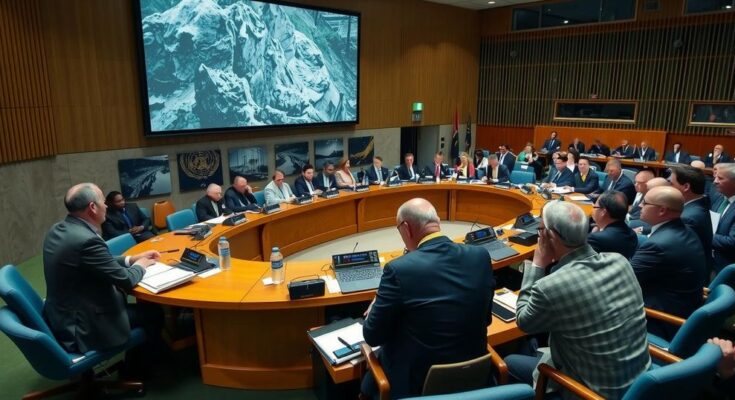Negotiators at the UN climate talks in Baku are under pressure to finalize a financial aid deal for developing countries aimed at combating climate change. The talks have been marred by significant pushback against proposed financial figures that fall short of the USD 1.3 trillion necessary for meaningful climate action. Accusations of negotiating tactics by wealthier nations exacerbate frustrations among developing countries as time runs short.
As the United Nations climate talks continue in Baku, negotiators from various nations are grappling with the urgent need to finalize a financial aid agreement aimed at assisting developing countries in their efforts to combat climate change. A rough draft of a new financial proposal is facing significant pushback from African nations and small island states, leading some representatives from the Least Developed Countries (LDC) and the Alliance of Small Island States (AOSIS) to withdraw from negotiations. The last official draft proposed USD 250 billion annually by 2035, which falls drastically short of the USD 1.3 trillion required to effectively aid vulnerable nations against climate impacts.
Negotiators representing developing countries argue that affluent nations employ a strategy of prolonging discussions to diminish the negotiating power of poorer states. Panama’s chief negotiator, Juan Carlos Monterrey Gomez, expressed frustration over the negotiating tactics employed by wealthier nations, asserting that these tactics weaken the resolve of developing countries as time progresses. Amid mounting desperation as flight schedules loom, representatives fear that concessions may lead to inadequate agreements that fail to reflect the dire climate financial requirements.
Despite the overarching goal of securing a climate finance deal, notable disparities persist regarding the proposed financial figures. Wealthy nations are bound by a 2015 Paris agreement to assist vulnerable countries, yet the ongoing discussions reflect a significant gap between requested funds and offers being considered. Irish Environment Minister Eamon Ryan mentioned the likelihood of revised numbers, emphasizing the necessity to not only determine the financial amount but also the means to achieve the anticipated USD 1.3 trillion target.
The context of these discussions lies in the global recognition of climate change as a critical threat, particularly to developing and vulnerable countries. The Paris Agreement of 2015 established a framework in which wealthy nations committed to assist poorer countries adapt to the immediate impacts of climate change and transition towards sustainable energy solutions. Despite these commitments, there is a prevailing struggle to secure adequate financial resources, particularly as developing nations seek to address loss and damage from climate-related disasters, alongside the need for climate resilience measures.
In summary, the ongoing UN climate negotiations in Baku underscore the pressing challenges faced by developing nations in securing adequate financial support for climate adaptation and mitigation. Despite calls for increased funding, negotiations remain contentious, marked by accusations of inequitable treatment and financial offers that fall significantly short of the expressed needs. The urgency for a sustainable and fair resolution is palpable, as stakeholders continue to navigate the complexities of global climate financing.
Original Source: www.theweek.in




